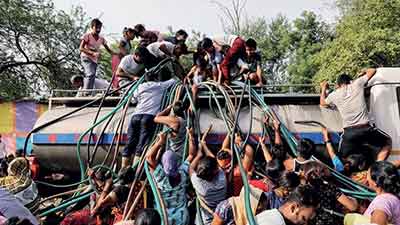Date: 15/02/2023
Relevance: GS-2: Government Policies and Interventions for Development in various sectors and Issues arising out of their Design and Implementation.
Key Phrases: Jal Jeevan Mission (JJM), piped water to every rural household by 2024, functional tap water connections, Quality of Tap Water, potable water, Community participation.
Why in News?
- The Jal Jeevan Mission (JJM) is a marquee scheme of the Government of India aimed at providing piped water to every rural household by 2024.
- The scheme was launched in 2019 with an ambitious target of providing functional tap water connections to all 19.3 crore rural households.
- The Finance Minister has allocated ₹69,684 crores for the scheme in the 2022 Budget, a 27% increase from the revised estimates for the previous year.
Current Status of JJM:
- As of February 2023, the JJM dashboard on the Jal Shakti Ministry website reports that over 11 crore households, or about 57% of the targeted households, now have tap water.
- While this is an impressive jump in percentage points over the past three years, it will be difficult to ensure that the remaining 47% are connected with only 12 months left until the targeted deadline.
Coverage Status:
- Only four states, namely Goa, Gujarat, Haryana, and Telangana, have reported 100% coverage of eligible households with piped water.
- Punjab and Himachal Pradesh are close to achieving the same, with over 97% coverage. Excluding these states, only 10 other states or union territories have reported over 60% coverage.
- Large, populous states such as Uttar Pradesh and Rajasthan have reported only 30% coverage, and Madhya Pradesh, around 47%.
Quality of Tap Water:
- A fully functional tap water connection is defined as a household getting at least 55 litres of potable water per capita per day all through the year.
- However, local reports suggest that despite having a tap connection, several village households revert to their local groundwater resources as the quality of supplied tap water is inadequate.
- Additionally, several institutions such as Anganwadi and schools have reported high levels of chlorine as well as problems with bacterial contamination.
Assessment of the Scheme:
- Few independent assessments of the scheme exist. A sample survey of around 3,00,000 eligible households that was commissioned by the Ministry of Water Resources found only three-fourths of them reported water seven days a week, and, on average, households were getting water for only three hours a day.
- Moreover, the current numbers on the adoption in households are based on self-reporting by villages and are not certified by a third party.
Suggestions for Improvement:
- Functional, permanent tap water is a basic necessity, and rather than aim to reach just a numerical target, the government should try to evaluate the extent of quality, and consistent adoption of tap water in rural India.
- While planned as a bottom-up scheme, the Centre must ensure that States with the lowest adoption and largest population be assisted with improving numbers, rather than only facilitating States that are close to the finishing line.
Way forward:
- The Jal Jeevan Mission is an ambitious scheme of the government aimed at providing piped water to every rural household by 2024.
- The financial allocation towards this mission has seen a significant increase in the recent budget, but the progress so far indicates that a lot more work needs to be done to achieve the target.
- Increase the pace of implementation:
- The current pace of implementation needs to be accelerated to ensure that the remaining 47% of households are connected to piped water within the next 12 months.
- Improve the quality of the water supply:
- The government should prioritize the quality of water supplied through the tap connection to ensure that households have access to potable water.
- Third-party assessment:
- Independent assessments of the scheme should be conducted by third-party organizations to provide a more accurate picture of the functioning of the scheme.
- Assistance to lagging states:
- The Centre must provide assistance to states with the lowest adoption rates and the largest population to help improve the numbers.
- Public awareness:
- Awareness campaigns must be launched to educate people about the importance of using piped water and the benefits of adopting it.
- Community participation:
- Local communities must be involved in the decision-making process to ensure that the scheme is tailored to the specific needs of each area.
- Efficient fund allocation:
- The funds allocated for the scheme must be utilized efficiently to achieve maximum results.
- Innovations and technology:
- New innovations and technologies can be leveraged to improve the implementation and efficiency of the scheme.
- Monitoring and evaluation:
- A robust monitoring and evaluation system should be put in place to track progress and identify areas that need improvement.
Source: The Hindu
Mains Question:
Q. Assess the progress and challenges of the Jal Jeevan Mission in providing piped water to every rural household in India. Critically evaluate the factors contributing to the uneven implementation of the scheme and suggest measures to ensure its successful implementation by 2024.






















